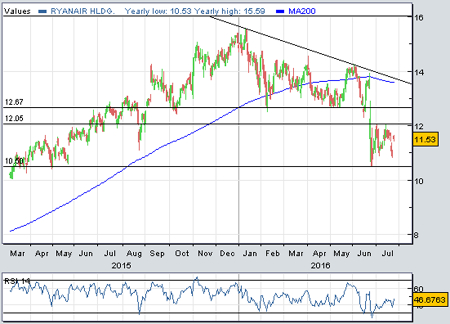Ryanair keeps beating easyJet
25th July 2016 13:17
by Harriet Mann from interactive investor
Share on
Battling against the violent winds of repeated terrorist attacks, strike action and the Brexit fall-out, managed to report a small increase in profit in its opening quarter. But the low-cost airline became the latest to warn of the potentially disastrous consequences of leaving the EU and has set out its plan to cut back investment in the UK.
Even though the price of an average ticket fell 10% to just under €40 during the three months to June, Ryanair managed to boost pre-tax profit by a "modest" 4% to €256 million (£214 million). That was in line with guidance, thanks to double-digit traffic growth to 31 million, two percentage-point increase in load factor to 94%, and 9% reduction in unit costs.
While an 8% drop in fuel costs to €518 million accounted for the bulk of savings, Ryanair also cut marketing spend, arranged cheaper financing, lower cost aircraft, weaker sterling and discounted airport growth deals. With most of 2017's fuel requirement already bought at $62 a barrel, Ryanair will save €200 million this year alone. Over half of 2018's fuel is already hedged at $50 a barrel.
Terror attacks, strikes and the absence of Easter certainly made it difficult for Ryanair to navigate the opening quarter, resulting in weaker close-in bookings fares and nearly 1,000 flight cancellations. Still, revenue inched 2% higher to €1.7 billion and, although net margin stayed flat at 15%, June's €886 million share buy-back scheme explains a 12% hike in earnings per share to 20.1 euro cents.
Management has now returned over €4.2 billion since 2008 and is looking to make more strategic buy-backs over the next 15 months. The budget carrier still has a strong balance sheet, with €162 million of net cash after investing €381 million and repaying €89 million of debt.

Brexit pain
Surprised and disappointed with last month's referendum result, the group is gearing itself up for a long period of political and economic uncertainty. It's continuing to adopt its "load factor active/yield passive" strategy, but with no crystal ball the future is hard to predict.
"Until some clarity emerges over the next two years about the UK's long term political and economic relationships with the EU, we will be unable to predict what effect it will have on our business and regulatory environment, but we have contingency plans in place for all eventualities."
From what it does know, the company expects fare pressure to remain until at least the end of 2017, with potential implications on its three domestic routes if the UK is refused access to the single market. "These risks are not material and will be manageable," the Ryanair reassures. For now, it's prioritising European airports over domestic bases, with capacity being cut on the London Stansted routes that are already ahead of growth targets this winter.
Management is still confident they can drive profits 12% higher to €1.38-1.43 billion this year, but with many risks to the downside this could change quickly. Fares are expected to fall by at least 6%, softening from the 8% fall in the first half, although this depends heavily on August and September. In the third year of its Always Getting Better programme, new service, digital and inflight developments support a 1% beat on bookings compared to this time last year.
Although Ryanair's share price has fallen by a quarter in the year-to-date and is down 17% since the referendum, the group is easily outperforming easyJet and jumped 6% Monday.
Shares in the peer airline were temporarily suspended following the referendum result, after a hellish third quarter forced the orange-liveried carrier to issue a profits warning. Its market value has sunk 41% since the beginning of the year and has crashed by a third since the referendum.
This article is for information and discussion purposes only and does not form a recommendation to invest or otherwise. The value of an investment may fall. The investments referred to in this article may not be suitable for all investors, and if in doubt, an investor should seek advice from a qualified investment adviser.